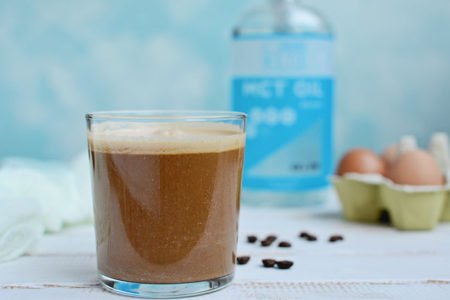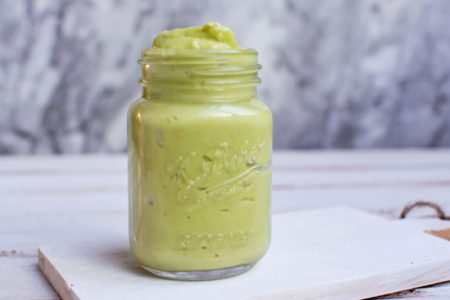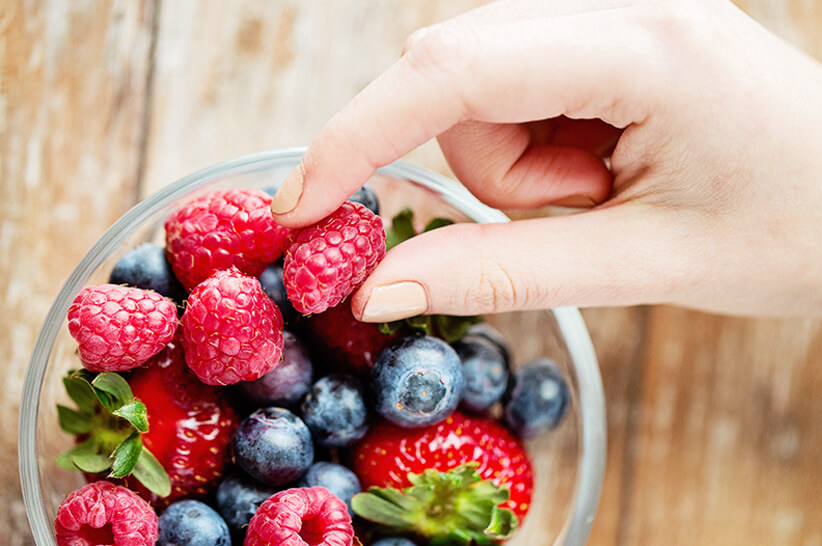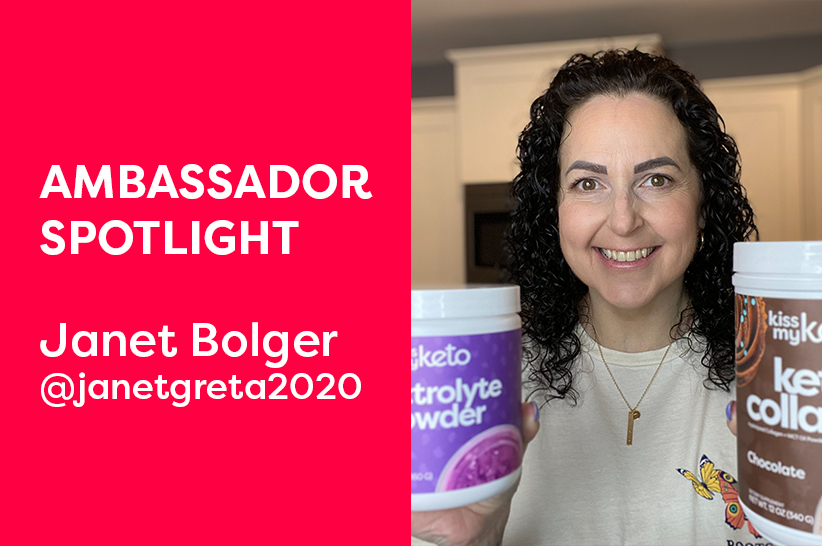Here is a list of the top 10 keto friendly fruits to eat on a keto diet. We also mention which ones you need to avoid because they’re too high in net carbs.
Being “nature’s candy,” fruits are notoriously high in sugar. They’re a source of glucose, sucrose, and fructose – all digestible carbohydrates that threaten to kick you out of ketosis.
So, can you eat fruits on keto?
Yes, you actually can!
There are many exceptions in the world of sugary fruits. Some fruit is high in fiber and fat while being low in blood-glucose-spiking carbs. These fruits will help you get more fiber, vitamin C, and antioxidants on your keto diet. They’ll also make smoothies more fun.
Below is a list of the 10 best keto-friendly fruits out there. We’ll also mention some of the worst fruit for the keto diet you’ll want to avoid.
1. Avocado
What fruit is lowest in carbs?
It’s avocado hands down! It’s so low in carbs it deserves the title of best fruit for keto. Lisa Richards, CNC from The Candida Diet explains that,
“Avocados are typically the go-to fruit for keto dieters because of their significant amount of healthy fats.”
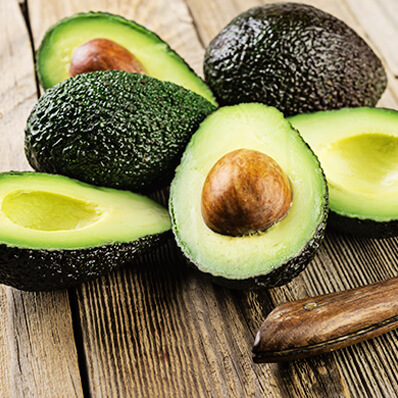
Avocados are an excellent source of healthy fats, plus they’re low in carbohydrates.
A half of a medium avocado (around 100g) has only 1.8 g net carbs but a generous 14.7 g of fat, 70% of which is monounsaturated 1. Other than its fantastic macros balance, avocado will help you meet your other nutrient needs. The same serving provides 27% of the daily value (DV) for fiber, 17% DV for vitamin C, 20% DV for folate, and 14% DV for potassium.
Use avocado as a banana substitute in smoothies. Or enjoy avocados as snacks, make avocado toast, and mash it into guac.
2. Coconut (Meat)
Right after avocados, coconut is one the best keto fruits you could eat.
Don’t be fooled by “nut” in coconut, though. Coconuts are botanical drupes (types of fruit). However, unlike most fruits, they’re high in fat.
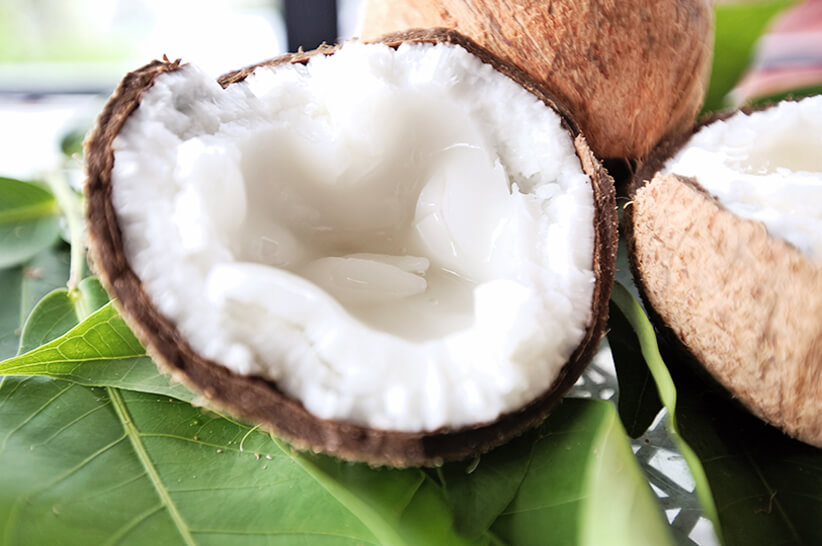
A cup of coconut meat, for instance, has almost 27 g of fat, most of which is saturated 2. And you’ll get only 5 g of net carbs in that same serving. As far as micros go, this tropical fruit is richest in minerals: 60% DV for manganese, 17% DV for copper, 12% DV for selenium, and 11% DV for iron.
Add coconut meat to your diet in the form of coconut flour, coconut flakes, coconut milk, and coconut butter.
3. Strawberry
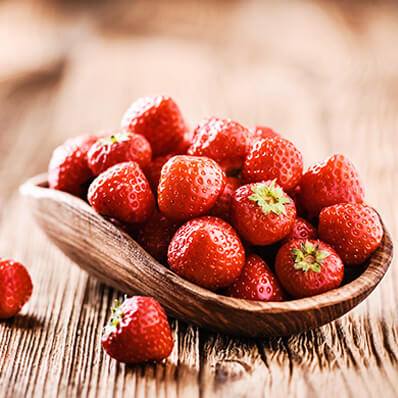
Strawberries are high in polyphenols — compounds that offer protection from various diseases.
Berries are lower in carbs than most fruit, which is especially true for strawberries.
This keto-friendly fruit is 90% water, and a cup of whole strawberries has only 8.4 g net carbs, along with 0.4 g of fat and 1 g of protein. 3. The same amount has more vitamin C than an orange at 141% DV. You’ll also get 12% of the DV for fiber.
Another noteworthy feature of strawberries is their phenolics. These are antioxidant anti-inflammatory compounds that researchers believe can help prevent cardiovascular diseases, neurodegenerative diseases, inflammation, and cancer 4.
4. Rhubarb
Ok, so rhubarb is a leafy green technically speaking. But people grow it for its juicy, rosy stalks, which are cooked sweetened with other fruits.
Whatever you call it, the most important thing is that it’s low-carb.
A cup of chopped rhubarb will contain only 3.3 g net carbs 5. It’ll also contain 1.1 g of protein and 0.2 g of fat. Micronutrients rhubarb is rich in include vitamin K (45% DV), vitamin C (16% DV), manganese (12% DV), potassium (10% DV), and calcium (10% DV).
Ways to enjoy rhubarb include tarts, pies, muffins, pancakes, crumble bars, smoothies, and cocktails.
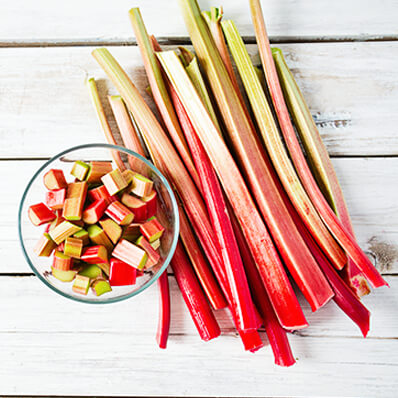
Rhubarb is a great ingredient for keto-friendly desserts and beverages.
5. Star Fruit
One of the best tropical keto fruits to make it on our list is star fruit, aka carambola.
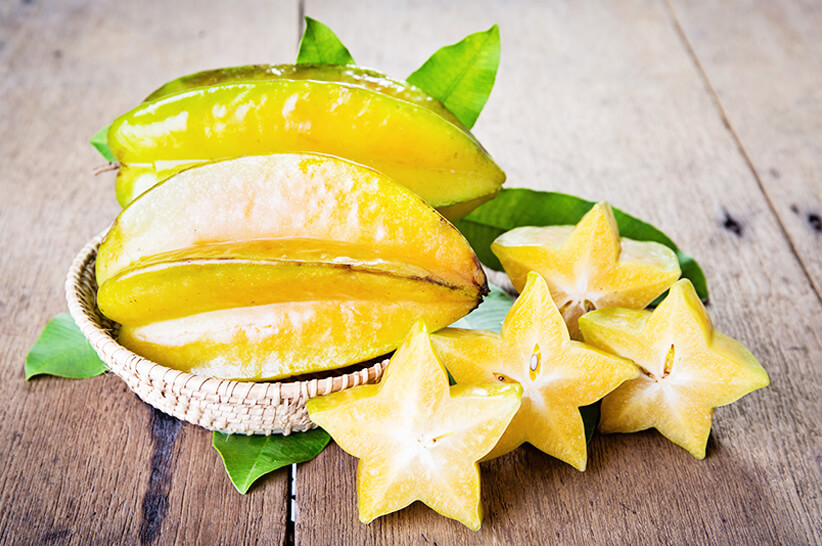
A cup of cubed star fruit has only 5.3 g net carbs, 1.4 g protein, and 0.4 g fat 6. The same serving will give you lots of vitamin C (78% DV), fiber (15% DV), and copper (9% DV). Studies found it was helpful against inflammation, infection, and digestive ulcers 7.
You’ll find the highest quality star fruit at Asian supermarkets. They’re great in tarts, pies, stir-fries, and as a meat side dish.
6. Raspberry
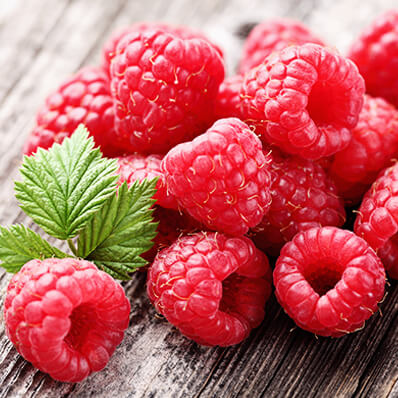
Add raspberries to your keto yogurt, salads, smoothies, and pancakes.
Another berry to make your keto diet staple is raspberry.
Like most berries, raspberries are low in carbs. A cup will give you 6.7 g of net carbs along with 1.5 g of protein and 0.8 g of fat 8. The same serving will be a good source of vitamin C (54% DV), manganese (41% DV) vitamin K (12% DV), and magnesium (7% DV).
Raspberries contain raspberry ketones. These are phenolics that give raspberries their characteristic aroma. Animal studies linked them to weight loss and prevention of weight gain, but the evidence isn’t strong enough to suggest they work in humans 9.
7. Blackberries
A succulent, sweet fruit, blackberries are also keto-friendly. And as you’ll see, they’re incredibly nutrient-dense too!
A cup of blackberries has 7.1 g net carbs, 2 g protein, 0.7 g fat 10. They’re a reliable source of vitamin C (50% DV), manganese (47% DV), fiber (31% DV), vitamin K (36% DV), copper (12% DV), folate (9% DV), and magnesium and potassium (7% DV).
Like all berries, they’re rich in health-boosting phytochemicals such as flavonoids, anthocyanins, cyanidin, and ellagic acid.
Use them in smoothies, pancakes, muffins, in yogurt, and as cake decoration.
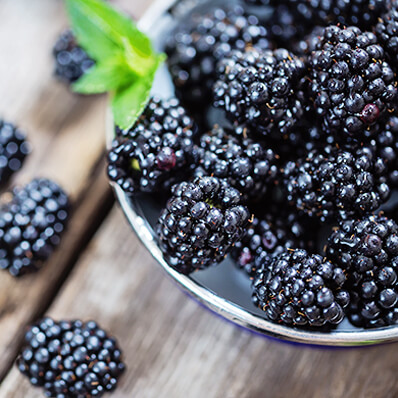
Blackberries aren’t just delicious, but they also contain health-boosting properties.
8. Watermelon
As the name implies, watermelon is mostly water (91%). It also contains carbs in moderate amounts, which makes it ok on a keto diet.
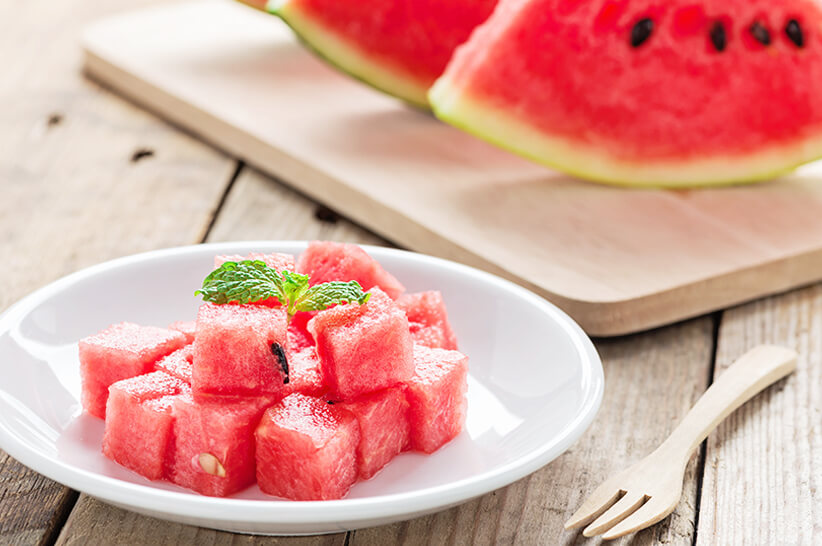
A cup of diced watermelon has around 11 g of net carbs and negligible amounts of fat and protein 11. It is also a decent source of vitamin C (21% DV), vitamin A (17% DV), and potassium (5% DV).
Because watermelon has slightly more carbs than most other keto fruits, practice moderation. Use watermelon as a flavoring in salads, juices, slushies, and skillets.
9. Cantaloupe
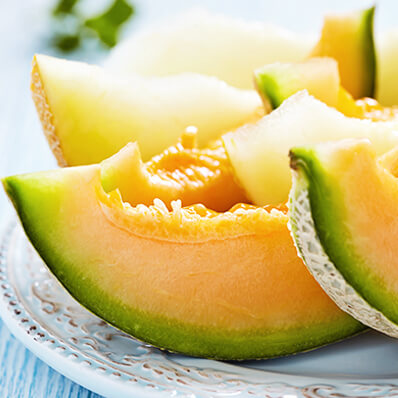
Keep in mind that cantaloupe has more carbs than some keto fruits.
Cantaloupe is another fruit you can enjoy on a keto diet in moderation. It has a relatively low carb content and it’s a good source of important nutrients.
A cup of diced cantaloupe has 12 g net carbs, 1.3 g protein, and 0.3 g fat 12. It provides 106 % of the DV for vitamin A, a nutrient that’s essential for skin and eye health as well as cancer prevention 13. Besides that, you’ll get vitamin C (95% DV), potassium (12% DV), and folate (8% DV) from cantaloupe.
Use cantaloupe balls to make a fruit salad, add it to summer greens salads, or add a bit to smoothies.
10. Lemon
There are two reasons to include lemons into your keto meal plan: they’re low in carbs and to add lots of zesty flavor to meals.
A medium-sized lemon has only 5.4 g net carbs and a tiny amount of fat and protein 14. It’s a well-known source of vitamin C (74% DV) and other vitamins as well as minerals in small amounts.
Like other citrus fruits, lemons have antioxidant properties thanks to vitamin C and flavonoids. These compounds seem to be particularly powerful in preventing cancer 15.
Use lemons in lemon water, vinaigrettes, sprinkled over grilled fish, and sugar-free lemonade.

Fresh lemons make your meals so much better.
Fruits You Should Avoid
We’ve answered “what fruit can you eat on keto?”
But it’s also nice to know which ones to sidestep in the produce aisle:
- Medjool dates: Just one date will give you 16.4 net carbs 16! Let that sink in.
- All dried fruit: A quarter cup of cranberries, for example, has 31 g of net carbs 17.
- Bananas: Are bananas keto? According to Lisa Richardson, “Bananas are possibly the worst fruit to eat while following the keto diet…with nearly 25 g of carbs 18. ”
- Mangos: As much as you may love mangos, a cup has 25 g net carbs 19.
- Apples: Can I eat apples on keto? Only if you want to keep ketosis at bay. One small apple has 17 g of net carbs 20.
Conclusion
Besides these high-carb offenders, there are many other examples of fruits you’d want to avoid. When in doubt, check a fruit’s net carb count through diet trackers and food databases.
Otherwise, stick to the 10 keto-friendly fruits and you’ll avoid going over your daily carb limit unnecessarily. You’ll also get plenty of fiber, vitamin C, and phytonutrients – all things you need to be healthy and feeling good.


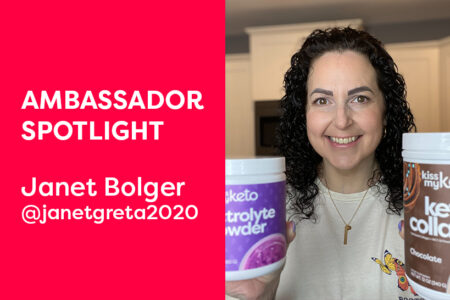

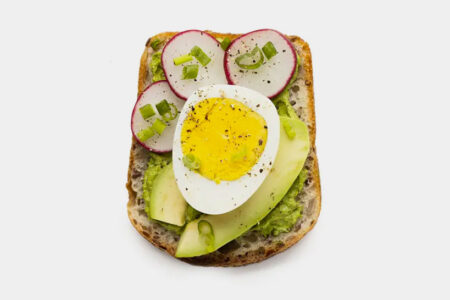
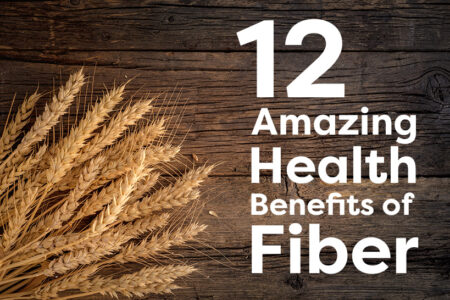


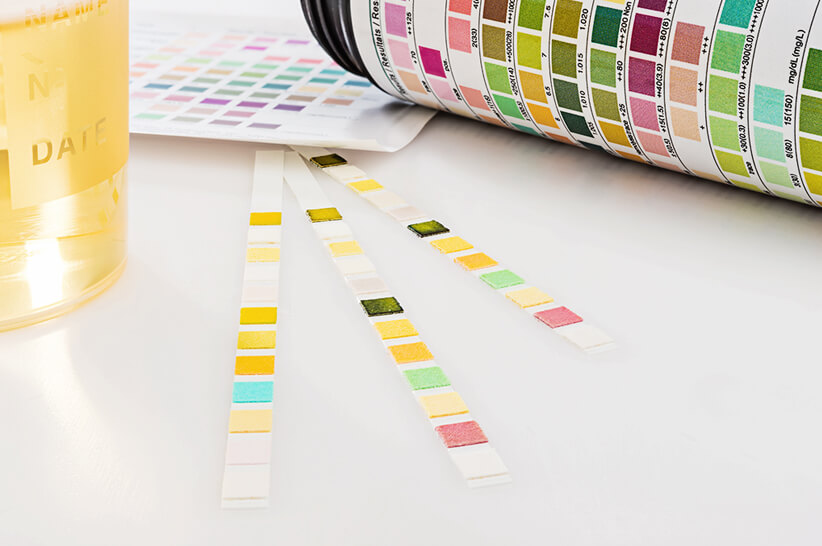
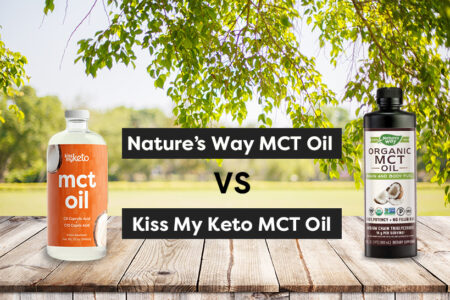
![Juicing for Weight Loss: Everything You Need to Know [Plus Recipes]](/wp-content/uploads/2019/08/Juicing-for-Weight-featured-image.jpg)

